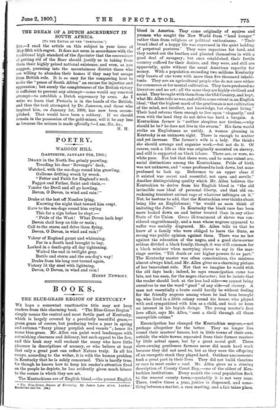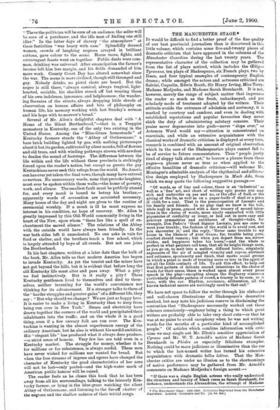BOOKS.
THE BLUE-GRASS REGION OF KENTUCKY.*
WE hope a somewhat unattractive title may not keep readers from this charming book. "The Blue-Grass Region" simply means the central and most fertile part of Kentucky, which is largely covered by a peculiarly beautiful grass,— green grass of course, but producing twice a year in spring and autumn "fuzzy plumy purplish seed vessels " ; hence its name blue-grass. Mr. Allen can paint word landscapes with astonishing clearness and delicacy, but such appeal to the few, and this book may well enchant the many who have little pleasure in descriptions of scenery, or who believe at least that only a great poet can reflect Nature truly. In all his essays, accordi g to the writer, it is with the human problem in Kentucky that he is solely concerned. This is hardly true, for though he knows how to keep his reader's attention fixed on the people he depicts, he has evidently given much labour to the scenes in which they are set.
The Kentuckians are of English blood,—the purest English
• The Blue-Grass Region of Kentucky. By James Lane Allen. London : Macmillan and Co. [63.1
blood in America. They came originally of squires and yeomen who sought the New World from "land hunger" rather than from religious or political enthusiasms. "Their broad ideal of a happy life was expressed in the quiet holding of perpetual pastures." They were rapacious for land, and they rooted out the heathen and planted themselves in with a good deal of savagery; but once established, their fertile country sufficed for their desires, and they were, and still are apparently, quite without the usual American rapacity for money. With a population exceeding two millions Kentucky only boasts of one town with more than five thousand inhabi- tants. They are an agricultural people who do not care either for commerce or for mental cultivation. They have produced no literature and no art; all the same they are highly civilised and social. They brought with them from the Old Country, and kept, what Mr. Allen tells us was, and still to some extent is, an English ideal, "that the highest mark of the gentleman is not cultivation of the mind, not intellect, not knowledge, but elegant living." Their land returns them enough to live upon "elegantly," and even with the land they do not drive too hard a bargain. A Kentuckian farmer is "neither sleepless nor tireless,—why should he be? he does not live in the swarm." His farm would strike an Englishman as untidy. A woman gleaning in Kentucky is an unknown sight. There is enough to scatter and yet increase. The farmer's wife is a lady. She thinks she should arrange and organise work,—but not do it. Of course, such a life as this was originally mounted on slavery, and still is supported on black labour. There are, or were, no white poor. Not but that there were, and to some extent are, social distinctions among the Kentuckians. Pride of birth was not unknown, and "some professed to look down, but none professed to look up. Deference to an upper class if it existed was secret and resentful, not open and servile." Another distinguishing quality which Mr. Allen believes the Kentuckian to derive from his English blood is "the old invincible race ideal of personal liberty, and that old an- reckoning truculent animal rage at whatever infringes on it." Not, he hastens to add, that the Kentuckian ever thinks about being like an Englishman; "he would as soon think of imitating the Jutes." In Kentucky the black race has been name looked down on and better treated than in any other State of the Union. Gross ill-treatment of slaves was con- sidered ungentlemanly, and. a man whose negroes appeared to suffer was socially disgraced. Mr. Allen tells us that be knew of a family who were obliged to leave the State, so strong was public opinion against them. There was no law against the education of the negro, and a good slave-owner seldom divided a black family, though it was still common for a black minister when marrying slaves to gay in the mar- riage service, "Till death or our higher powers do us part." The Kentucky master was often conscientious, the mistress almost always kind, and Mr. Allen gives us a charming picture of her benevolent rule. Not that we imagine he would wish the old days back; indeed, he says emancipation came too late, not too soon, for the negro character; but he insists that the reader should look at the less bad side—we cannot bring ourselves to use the word " good " of any side—of slavery. A man not essentially a brute could hardly be without feeling for the friendly negroes among whom he had been brought up, who lived in a little colony round his house, who played with and sympathised with him as a child, and took so keen an interest in his boyish doings. The young master's first love affair, says Mr. Allen, "sent a thrill through all those susceptible cabins."
Emancipation has changed the Kentuckian negroes,—not perhaps altogether for the better. They no longer live round their masters' houses, but in little towns of their own, outside the white towns, separated from their former masters by little actual space, but by a great moral gulf. These slave-owning gentlemen farmers never did much hard work because they did not need to, but as they were the offspring of an energetic stock they played hard. Outdoor amusements took a great part in their lives. They did not build theatres or care to meet under a roof. Mr. Allen gives us a stirring description of County Court Day,—one of the oldest of Ken- tuckian institutions. Every month the rural population flock to the nearest county town,—probably it is not very near. There, twelve times a year, justice is dispensed, and some- thing between a market, a race meeting, and a fair takes place. 'There the politician will be sure of an audience, the seller will be sure of a purchaser, and the idle man of finding one still idler." In the latter days of slavery "the atmosphere" at these festivities "was heavy with ease." Splendidly dressed women, crowds of laughing negroes arrayed in brilliant cottons, gave colour to the scene. Horse races, fights, and extravagant feasts went on together. Public duels were com- mon, drinking was universal. After emancipation the farmer's income left him less margin, and his fields demanded of him more work. County Court Day has altered somewhat since the war. The scene is more civilised, though still thronged and gay. Nobody drinks, no pistol shots are heard. But the negro is still there, "always comical, always tragical, light- hearted, sociable, his shackles struck off but wearing those of his own indolence, ignorance, and helplessness ; the wander- ing Socrates of the streets, always dropping little shreds of observation on human affairs and bits of philosophy on human life, his memory working with last Sunday's sermon and his hope with to-morrow's bread."
Several of Mr. Allen's delightful chapters deal with "A Home of the Silent Brotherhood,"—that is, a Trappist monastery in Kentucky, one of the only two existing in the United States. Among the "Blue-Grass homesteads" of Kentucky farmers stands the "Abbey of Gethsemane," a bare brick building lighted by gas, with nothing picturesque about it but its garden, cultivated by silent monks, full of flowers and old trees, and with winding pathways strewn with sawdust to deaden the sound of footsteps. The difference between the life within and the life without these precincts is strikingly forced upon the reader's notice, but except as guests the gay Kentuckians never seek this refuge from the world. No Amen. can has ever yet taken the final vows, though many have entered as novices. No unnecessary words, none that provoke laughter, must ever be spoken within these walls,—the home of poverty, work, and silence. The smallest fault must be publicly atoned for, and every monk is bound to betray his brother,— apparently words of accusation are accounted necessary. Many hours of the day and night are given to the routine of ceremonial worship. If a monk is ill he must express no interest in his condition, no hope of recovery. Mr. Allen is greatly impressed by this Old-World community living in the heart of the New, upon whom "there lies like a spell of en- chantment the sacred silence." The relations of the Abbey with the outside world have always been friendly. In the war both sides left it unmolested. No one asks in vain for food or shelter, and the brothers teach a free school, which is largely attended by boys of all creeds. But not one joins the Brotherhood.
In his last chapters, written at a later date than the bulk of the book, Mr. Allen tells us that modern America has begun to invade Kentucky. • As yet the tourist and the miner have not got beyond the hills, but it is evident that before long the old Kentucky life must alter and pass away. What a pity ! we feel instinctively. But is it really a pity ? These Kentucky gentlemen lived to themselves and died to them- selves, neither inventing for the world's convenience nor thinking for its advancement. If a stranger talks to them of the "harder struggles and greater gains" of a different life, they say : "But why should we change ? We are just as happy here. It is easier to make a living in Kentucky than to keep from being run over in New York." Steam and electricity have drawn together the corners of the world and precipitated their inhabitants into the traffic, and on the whole it is a good thing, even if a few unwary folk are run over. The Ken- tuckian is wanting in the almost -superhuman energy of the ordinary American, but he also is without his sordid ambition. His "elegant life" has produced what it always does produce, —a strict sense of honour. Very few lies are told even in a Kentucky market. The struggle for money, whether it be for millions or for subsistence, is always sordid. These men have never wished for millions nor wanted for bread. But when the free streams of ingress and egress have changed the character of Kentucky the good characteristics of her sons will not -be lost—only pooled—and the high-water mark of American public honour will be raised.
The reader feels as he closes this book that he has been away from all his surroundings, talking to the leisurely Ken- tucky farmer, or lying in the blue-grass watching the silent Abbey of Gethsemane, and listening to the far-off chatter a the negroes and the shallow sadness of their trivial songs.



































 Previous page
Previous page